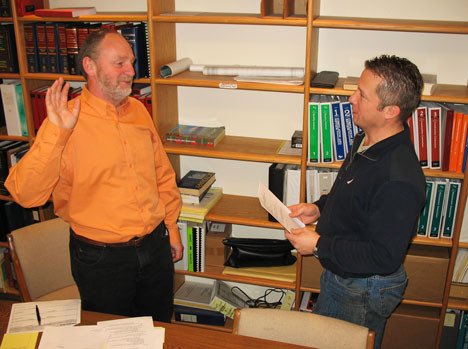FREELAND — Now that the Port of South Whidbey has a full complement of commissioners, it’s going to be a busy year.
Wednesday at a special workshop, the three port commissioners — veteran Geoff Tapert and newcomers Curt Gordon and Chris Jerome — began to tackle a range of ideas that they hope will create a stronger economic climate.
They will continue to oversee recreation opportunities on South Whidbey, with an eye toward protecting the environment, but it really is all about the recession and how the port can be a significant factor in a financial turnaround.
While determined to make the port a key part of South Whidbey’s economic fabric, a primary component of last November’s campaign strategy, the three port commissioners and port staff intend to broaden the focus.
“Curt and I need to get a handle on the long-term budget picture so we can set priorities,” Jerome said. “It’s time to get those ducks in a row.”
Gordon agreed.
“We have to focus on the money first before we can explore any projects; that’s the first order of business,” he said.
Among the concepts being floated are buildings that the port might buy or lease that would offer space for new businesses. Another consideration is the need for a new port home office.
Tapert recommended buying versus renting.
“The idea is to sublet space to other businesses as a revenue-generator,” he said. “The real estate market is such that there are some good deals on South Whidbey now.”
Commissioners will also look into providing economic development assistance and consulting services on the South End.
The port will begin addressing transportation concerns, too. On the table are ideas for car, moped or bicycle rentals for harbor visitors, a plan to share autos for ferry riders and a shuttle or tram service to move people around Langley.
Commissioners also talked about partnering with Island Transit about a shuttle service taking marina visitors to South Whidbey businesses and attractions.
“I’m very interested in how the port can work to help get visitors and commuters on and off the island,” Gordon said. “Whether that means working with Mukilteo on park-and-rides or sharing cars, the port should be taking the lead.”
Other ideas include a cellphone tower lease, potential income from kayak rentals and a hot dog stand, a commercial kitchen rental space and a self-sustaining program where credit-worthy small business owners could acquire loans from the port district to grow their businesses.
Along those lines, the port might coordinate a broad health insurance risk pool among interested South Whidbey small business owners, and put out a contract to bid among insurance providers.
Tapert said the idea of a bond or levy increase isn’t likely this year, especially after voters turned down an $8.2 million marina bond in 2008. He added that when the economy turns around, however, it might become feasible for commissioners to look at the idea again.
“I can’t speak for my colleagues, but one thing that was floated around election time was a potential levy which had ‘something for everyone,’” he said. “In other words, rather than go small and continue to scale back on a proposal, we could plug in a combination of projects that avoids the argument of ‘Why should I pay for Langley’s marina?’”
Tapert said such combined-effort projects could include an industrial park surrounded by the theme of “sustainability,” a port office and incubator space, and the pending phase one marina expansion.



